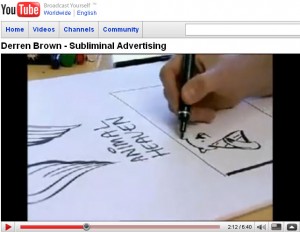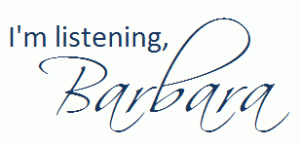Based on the presentation Crisis Management: The Savvy Communicator by Kami Huyse. Used with permission.
that’s an original idea? seriously?
Have you ever written or created something, and later realized that it was based on something you had already seen (and was not completely your original work)? It’s probably happened to us all.
Magician and mentalist Derren Brown explains in this short video how subliminal messages may affect us. (I would have embedded the video from YouTube, but embedding for this specific video was disabled.)
Many thanks to the folks at Stuff You Should Know for mentioning this video in their podcast on How Deja Vu Works.
FAQs on PRCA 2330 Blogs
PRCA 2330 Students: Thanks so much for completing the Blog Checklist.
In general, you can find many of your answers in the Blogging Guidelines post from January 21 or at WordPress.tv.
Here are answers to some of the more frequently asked questions:
How many posts are we supposed to have in each category?
- See Blogging Guidelines post from January 21. (To me, this is almost like asking “exactly how many words should be in my term paper.”)
When we comment on another page how or where are we suppose to post a link for you to see it?
- See #5 in the Blogging Guidelines post from January 21.
Do we have to have personal blogs?
- Yes. You do need to have personal blog posts. See #6 in the Blogging Guidelines post from January 21.
How do you add bullets in your blog?
- When you are writing or editing your post, click the button on the toolbar for bullets (very similar to how you’d insert bullets in Microsoft Word). The bullet button is the fourth from the left.
I am still confused on how to insert a hyperlink.
- Use the toolbar button that looks link two chain links. Here’s how to insert hyperlinks.
I have created the various pages and assignments categories, but can’t seem to make the assignments correlate with their correct pages. How can I fix this? Any ideas?
- My best guess is that you’ve created Pages, not Posts. There’s a big difference in WordPress between pages and posts. If this is what you’ve done, simply copy the info from the page and paste it into a new post. Then you should be able to apply the correct category.
How do I change the “Just another WordPress blog” tagline?
- On the left side of your screen in the Dashboard, click on Settings, then choose General. You can change the tagline (and many other things) there.
How do I apply a new theme to my blog? (I tried to change the visual appearance on the dashboard, but it won’t seem to work?)
- See WordPress.tv’s short video on how to preview and activate a new theme.
How do I embed a video into my blog?
- See WordPress.tv’s short video on how to embed video (as well as photos, audio, etc.)
Do you think you could clarify what is to be going in our blogs more often? I feel like no one really knew we were supposed to be doing so much in our blogs because it is never spoken of in class. Thanks.
- Please, please ask questions in class or visit me in my office hours.
More questions? Just ask.
PRCA 2330 :: Listening to PR Podcasts
 I simply can’t imagine how I’d stay up to speed in the ever-changing world of public relations without listening to podcasts. My iPod stays filled with a variety of podcasts, and I listen to them on my 100-mile roundtrip commutes to Georgia Southern.
I simply can’t imagine how I’d stay up to speed in the ever-changing world of public relations without listening to podcasts. My iPod stays filled with a variety of podcasts, and I listen to them on my 100-mile roundtrip commutes to Georgia Southern.
Since we have no class on Wednesday, April 1 (as I will be presenting twice at the Southern States Communication Association in Norfolk), here’s what you’ll do instead: listen and write.
- Listen to at least one hour of a public relations or social media podcast. Here are some suggestions; or, you can choose one of your own.
- Respond to this blog post with the name of the podcast you’ve chosen to listen to. (All you have to do is tell me the name of the podcast in the comment section of this post. No other information is needed here.) UPDATE: As of April 6, comments are closed.
- In your own blog, write a minimum of 250 words about what you got out of the podcast.
- Include hyperlinks to the website or show notes of the podcasts
- Be sure to mention the name(s) of the show’s host(s)
- Use the category of PR Connections for the post
- Due: No later than classtime on April 6
Seth Godin’s “Tribes”
In place of class on Monday, you watched a video of Seth Godin discussing his latest book Tribes. Many thanks to Andrew Warner of Mixergy for providing this video.
Seth Godin on Tribes–via Mixergy.com from Andrew Warner on Vimeo.
Based on what you saw and heard in the video, discuss the following in your own blog:
- What did you learn?
- What surprised you?
- What do you want to know more about?
Your post should be a minimum of 250 words and categorized as Assignment.
Include in your post:
- Hyperlink to the video (or embed the video if you’re bold!)
- Hyperlink to Seth Godin’s blog (Google it to find the address)
- Hyperlink to the book Tribes at an online retailer
PRCA 2330 Blog Checklist :: March Edition
 At the request of many students, I’ve created a blog checklist to help you be sure you are on track with what you need to include. Remember that your PRCA 2330 blog counts as nearly 1/3 of your grade in the course. Devote as much time to the care and nurture of your blog as you would to a term paper that counts that much. I strongly recommend that you keep up with your blog weekly.
At the request of many students, I’ve created a blog checklist to help you be sure you are on track with what you need to include. Remember that your PRCA 2330 blog counts as nearly 1/3 of your grade in the course. Devote as much time to the care and nurture of your blog as you would to a term paper that counts that much. I strongly recommend that you keep up with your blog weekly.
Please fill out this checklist before class on Monday. I’d appreciate it if you would fill it out once right away, before making any additions or changes to your blog, and then if your blog isn’t as robust as you know it needs to be, fill it out again after you fix things.
Public Relations Evaluation
In Wednesday’s Introduction to Public Relations course, we will discuss communication for PR practitioners. Here are the slides I’ll use:
To see some of the notes I used for the presentation, visit SlideShare and download the presentation.
Interview a Public Relations Professional :: PRCA 2330
 For this 50-point assignment, you will choose and interview a public relations professional, and then write about this interview at your blog. This post will be a minimum of 250 words. (It’s likely that it will take ~500 to answer these questions fully.)
For this 50-point assignment, you will choose and interview a public relations professional, and then write about this interview at your blog. This post will be a minimum of 250 words. (It’s likely that it will take ~500 to answer these questions fully.)
Though a face-to-face interview is preferred, a phone or webcam interview is acceptable.
Include an introductory paragraph that introduces the PR professional, including title and company, educational background, etc.
Questions/Topics you need to include:
- What’s a typical week like? (If no week is typical, then what was last week like?)
- Tell me about a project you worked on that you are especially proud of.
- How important is writing in your career?
- What three tips would you offer someone just starting out in PR?
- What do you do to keep current in the PR industry?
- After interviewing this person, are you (the PRCA 2330 student) more or less likely to want to have a career in PR? Why?
Some questions you may wish to ask:
- Did your education prepare you for working in PR? How?
- What has surprised you the most about working in PR?
- What do you wish you would have known before starting your career in PR?
- How has PR changed since you entered the field?
- How does technology affect your daily work?
- When your company is hiring for an entry-level PR position, what makes a candidate stand out?
- What professional organizations are you involved in? (For example, PRSA, IABC, etc.)
Additional recommended questions, crowdsourced on Twitter:
- Bruno Amaral: do you feel today’s students are prepared for the challenges of new PR?
- Jessica Lawlor: what’s your most and least favorite part of your job?
Some things you may wish to do:
- Include a photo of your interviewee. (This can be a photo he or she provides or one that you take yourself.)
- Link to your interviewee’s LinkedIn profile and/or blog.
As we discussed in class, you can feel free to use a Q / A format.
Questions?
Public Relations Program Planning :: FAQs
To see some of the notes I used for the presentation, visit SlideShare and download the presentation.
Job Interviews: 10 Things You Oughtta Know
In yesterday’s Intro to PR class, I shared 10 things that PR graduates ought to know about preparing for a job interview. Here’s the (relatively) raw audio from the class session. I recorded it live, using my new TuneTalk for my iPod, and did not edit it before posting it. You’ll hear what the class heard.
Many thanks to Auburn University’s Robert French for helping me to get this audio file posted. Robert is also Site Admin/Founder & “Carlton, Your Doorman” for PROpenMic.
Questions about interviewing?



